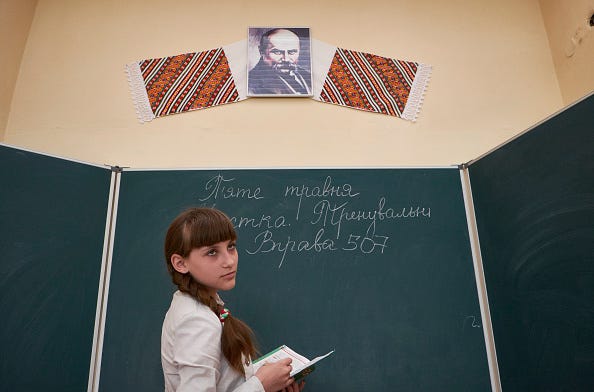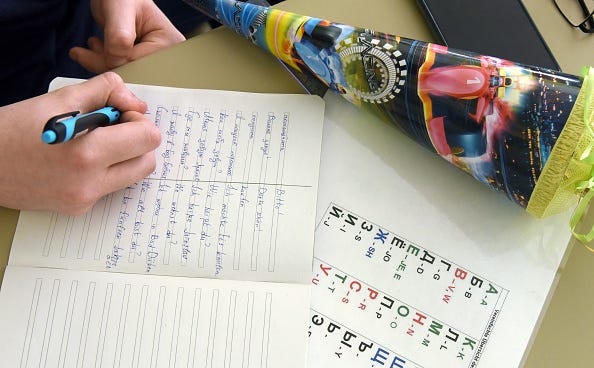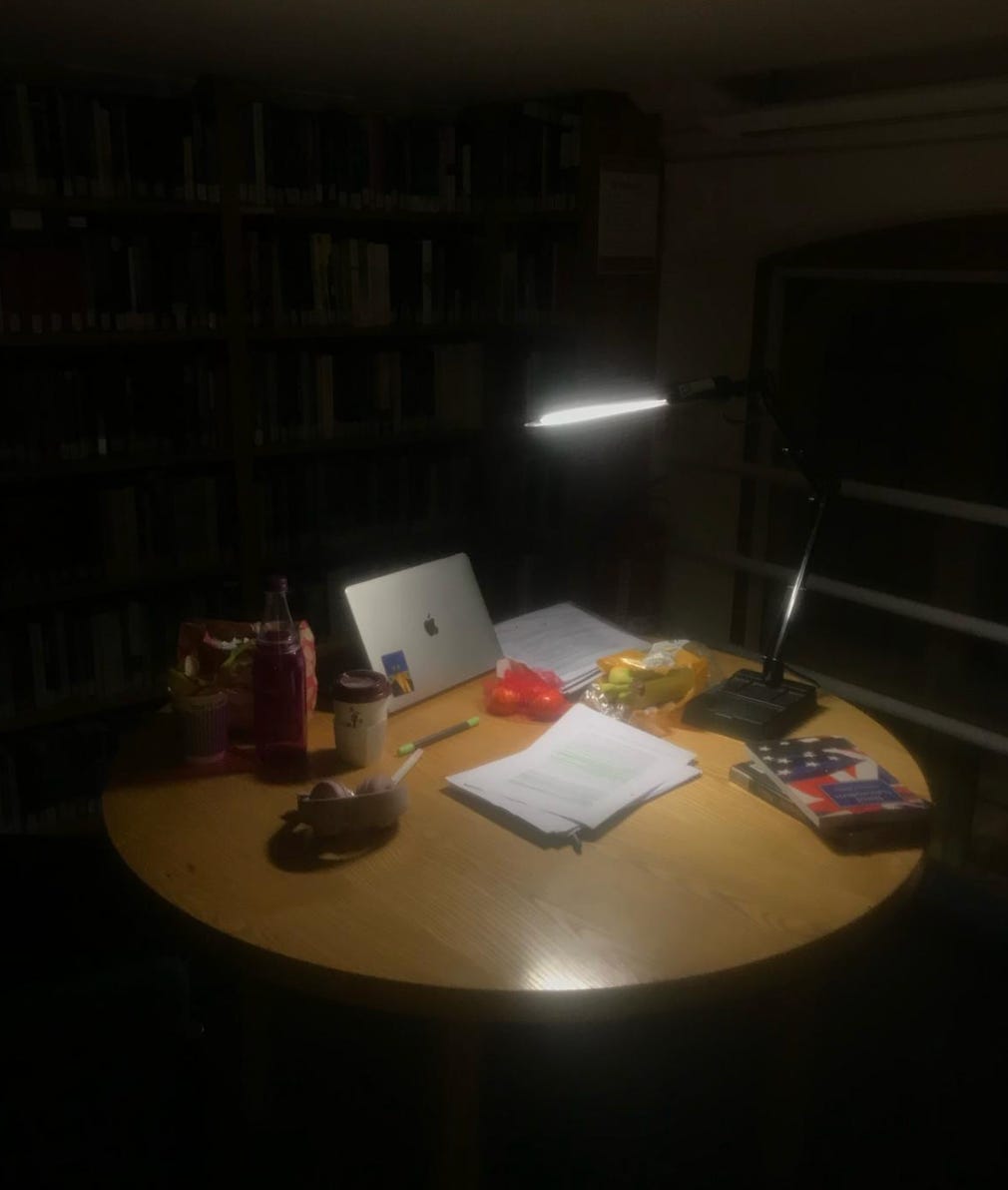How learning Ukrainian differs from learning Russian… and how it reflects culture.
Alessandra talks about getting her degree in Russian, then finding herself moving to Ukraine due to the war. This essay is about language, yes, but also how languages reveal the places they come from.
Editor’s Note: We’re struggling due to a wave of non-renewals as we pass our one-year anniversary. Many signed up for an annual membership last year, but declined to re-up.
Want to ensure that deeply-reported human interest news on Ukraine is here to stay? Update your subscription info, or upgrade to help us continue our work!
There are many mundane moments in our lives that unexpectedly become pivotal.
One of those for me is when my Russian teacher told me that there is no word for privacy in Russian.
It’s on a long list of words that have no equivalent in Russian, but this particular word stuck with me.
The words private – chastniy or personal – lichniy do exist in Russian, but the idea of privacy, a private, secretive realm each person has a right to, does not.
I realized the whole concept of privacy wasn’t organic to contemporary Russian society, which had been shaped by almost a century of communal living. But more than that, it made me think about the culture I had been raised in: was privacy so central to Britishness that I had assumed it was universal? Or was this something specific to the Russian mindset?
It was instances like these that made me want to study languages: moments that pull back the curtain on your own assumptions about the world.
So I decided I needed to study something that was as different as possible to the culture around me and chose to study Russian and Persian.
Although such revelations motivated me, they were few and far between. Most of my memories of studying Russian are unhappy ones: pushing myself to literal tears while trying to memorize participle endings, only to learn that using them at all sounded outdated and unnatural, or having to reach for a grammar book with a heavy sigh every time you wanted to write a sentence that involved both a number and a noun – and constantly finding, despite all your efforts, there was still some extra rule you didn’t know about.
I tried to explain this constant battle I found myself in to other Russian students. At first I’d thought that I wasn’t sufficiently disciplined, but I quickly learned my struggle wasn’t unique.
While I was getting my degree in Russian, I heard about multiple Russian language students, much more diligent and studious than myself, who had been brought to tears in class by their Russian teachers, and many others would admit to at least doing so in private.
Of course, there were exceptions among the professors – there were those who were reassuring and understanding – but overall it was clear there is a uniquely unforgiving and punishing storm that one has to weather in order to learn Russian.
After four years of finely tuning my Russian, I graduated a few months after the full-scale invasion started, into a world that was rejecting everything Russian.
After my dad started working in Kyiv and bought an apartment there, I started to come back and forth from Ukraine and planned to live there after University. I had always spoken Russian there, but now everything had changed.
When I first came back to Ukraine, I saw my friend Yana. I started speaking in Russian, as we had done for the last three or so years, and she politely asked if she could switch to Ukrainian. My stomach twisted with guilt. I, of course, should have asked, but it felt like such an absurd formality when talking with a close friend that I had decided against it.
In an attempt to bridge the gap that widened between us when we spoke, I did my best to use the Ukrainian words that I knew, but it only made the situation more awkward.
As we talked about our lives, there seemed to be an uncomfortable and embarrassing question that arose out of the distance between us: all that time I spent perfecting my Russian, all the time I spent in Ukraine and never once going to Russia as an adult, why had I never bothered to learn more than a few words of Ukrainian?
Each time I interrupted our conversation to ask for the Russian translation of a Ukrainian word, I felt the knot in my stomach again. Being one of my closest friends, Yana never said anything to me but she did not have to, it was clear both of us felt uncomfortable. The question followed me home that night and, to be honest, has never really left me since.

It’s difficult when something so political and so much larger than yourself suddenly appears in your personal relationships.
A few months after the war started I met up with another friend, Nika, a Kharkiv native. She had spoken Russian her whole life and only became fluent in Ukrainian at university but she enjoyed it. “It’s true you really do get to have a different personality in each language,” she told me once.
But despite this, it was not her first language.
She told me her sister had made the switch to Ukrainian.
“I know it’s wrong and I don’t know why but I find it really annoying,” she said, revealing the internal battle caused more by her unexpected feelings than anything else.
I spoke to Nika a few months after that. Early in the conversation she told me that we should switch to English because she didn’t speak Russian anymore.
I had known for a long time that I needed to make the switch to Ukrainian, but it was difficult. I finally felt free from the tables of case endings and endless variations on the verb ‘to go’ when I graduated, but now I was back at the beginning.
But learning Ukrainian couldn’t be more different.
My experience will always be informed by the full-scale invasion, and the new chapter of national pride Ukraine has entered, so my analysis is admittedly biased, but it is hard not to feel that there is something lighter and gentler about Ukrainian than Russian.
The long vowels lend the language a distinctly sonorous quality that makes it less harsh than Russian. The unique hidden poetry that each language carries seems to me to occur more frequently in Ukrainian: for example, the months are named after natural events. May comes from the Ukrainian word for grass, March and July are named after the Birch and Linden tree and February is Lyutiy, which translates as ‘the fierce month’ – it’s also, coincidentally, the month in which both the full-scale invasion and the war in 2014 began.

My experience of learning Ukrainian has not been one of anxiety, disappointment and shame like learning Russian, but rather one where I feel constantly encouraged and included, and one where, unlike Russian, your efforts feel rewarded.
When I studied Russian, my grammar was often corrected even in the most casual conversations. Although it was always intended as a helpful correction and never a criticism, this habit tended to become exhausting and demotivating. However now Ukrainians will frequently compliment my Ukrainian even if my sentences are an ugly patchwork of broken grammar and guesswork.
Learning Ukrainian after the start of the full-scale invasion, you can’t help but feel you are participating in something larger than yourself, because, after all, it is not just foreigners who are learning Ukrainian, but Ukrainians too.
According to a survey from a research center in Ukraine, in the first year of the war the number of Ukrainians using Ukrainian in daily life went from 64 percent to 71 percent, while those using Russian decreased by almost 10 percent.
The Ukrainian Ministry of Culture has even launched a free Ukrainian language program called Speak Ukraine encouraging Ukrainians to learn the national language. The website has encouraging quotes from authors like Voltaire: “You can learn a foreign language in six years, and you have to learn your own language all your life,” an outlook that embraces the act of learning and making mistakes as a part of the pleasure of a knowing a language, rather than a process of punishment.
Learning Ukrainian has been a much gentler experience than learning Russian, partially because Ukraine is especially dialectically diverse, with many in Ukraine speaking neither Russian nor Ukrainian but rather Surzhyk – a creative mixture of both languages that differs from person to person. Although there is, of course, correct and incorrect Ukrainian, the language spoken in Ukraine is characterized by a unique elasticity where there are many correct ways of saying the same thing.
If learning about the absence of the word privacy in Russian taught me about how words and language carry culture and history, learning Ukrainian after Russian taught me about how the culture of language instruction can do the same.
Russian, like English, has a history of being weaponized as a method of subjugation. For centuries, Ukrainians, like other peoples in the Soviet Union and Russian empire, were subjected to policies of Russification and were forced to speak Russian as a way of erasing their identity and the culture and history contained within their languages.
Russian language teaching, with its fixation on accuracy above all else, reflects an inflexible determination to hold onto linguistic purity – to erase everything that is other and never entangle with anything outside of itself.
Ironically this is a reminder of how often Russian does find itself deeply entangled in other languages. Just as Ukrainians speak Surzhyk, other countries from the former Soviet Union speak their own form of Russian intertwined with their national language. I have heard Tajiks break apart Persian verbs and mix them with Russian ones without even realizing it or Uzbeks who mix the alphabets of the two languages, increasing their vocabulary twofold and creating an ever changing range of grammatical and linguistic tools to create meaning.
The strictness of the Russian language and its teaching not only carries the memory of the decades spent forcing people to learn Russian as a way of erasing their non-Russian cultures, but also its monumental failure to do so – inevitably become subsumed as another tool in the ever more creative linguistic toolbox with very few rules at all.
Similarly, the English language carries memory of social segregation through basing ‘correct’ grammar on certain dialects. That has created the idea of ‘proper English’, which suggests that the grammatical rules that shape other dialects are incorrect and the dialects themselves, and the people and history they are a reflection of, are also somehow invalid.

The way I communicate in Ukraine has changed a lot in the last two years.
I am speaking more and more Ukrainian and am slowly forgetting my Russian.
When I do speak with Ukrainians who speak Russian as a first language, I find it almost impossible to avoid including Ukrainian words, and with Ukrainian speakers, despite my efforts, my Ukrainian is always intertwined with Russian.
If languages and their teaching are able to contain memories of history and culture, then perhaps the way I speak is also a record of my personal journey.
After the paywall: Russia is finally feeling the heat from Ukrainian attacks on their oil refineries and a blue flash lit up Ukraine’s sky last night — plot twist: it has nothing to do with Russia. And plus — a cat of conflict!
Keep reading with a 7-day free trial
Subscribe to The Counteroffensive with Tim Mak to keep reading this post and get 7 days of free access to the full post archives.





